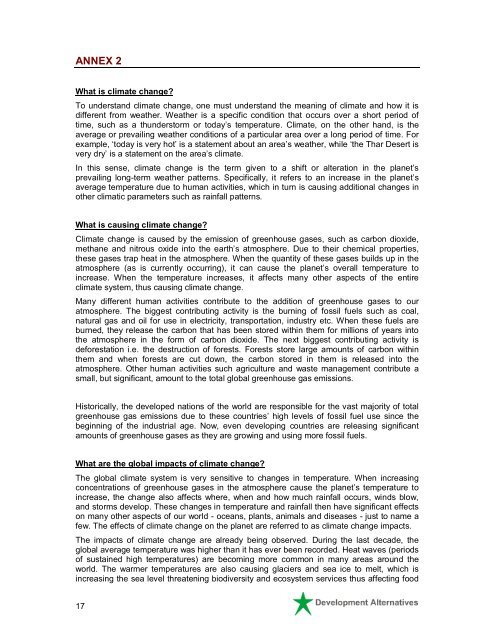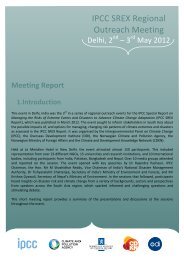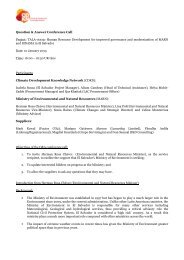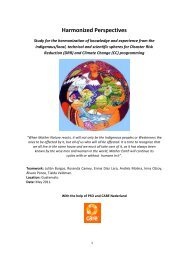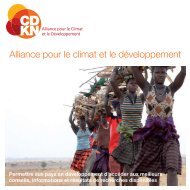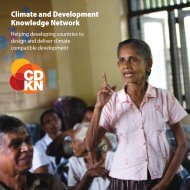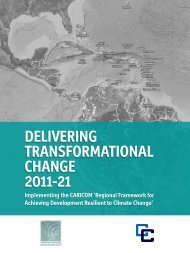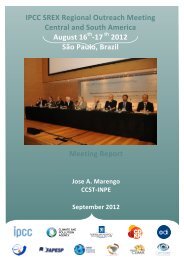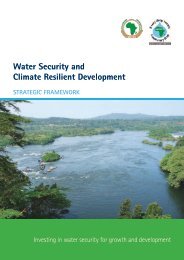Climate Change Guide for Community Radio ... - CDKN Global
Climate Change Guide for Community Radio ... - CDKN Global
Climate Change Guide for Community Radio ... - CDKN Global
You also want an ePaper? Increase the reach of your titles
YUMPU automatically turns print PDFs into web optimized ePapers that Google loves.
ANNEX 2What is climate change?To understand climate change, one must understand the meaning of climate and how it isdifferent from weather. Weather is a specific condition that occurs over a short period oftime, such as a thunderstorm or today’s temperature. <strong>Climate</strong>, on the other hand, is theaverage or prevailing weather conditions of a particular area over a long period of time. Forexample, ‘today is very hot’ is a statement about an area’s weather, while ‘the Thar Desert isvery dry’ is a statement on the area’s climate.In this sense, climate change is the term given to a shift or alteration in the planet’sprevailing long-term weather patterns. Specifically, it refers to an increase in the planet’saverage temperature due to human activities, which in turn is causing additional changes inother climatic parameters such as rainfall patterns.What is causing climate change?<strong>Climate</strong> change is caused by the emission of greenhouse gases, such as carbon dioxide,methane and nitrous oxide into the earth’s atmosphere. Due to their chemical properties,these gases trap heat in the atmosphere. When the quantity of these gases builds up in theatmosphere (as is currently occurring), it can cause the planet’s overall temperature toincrease. When the temperature increases, it affects many other aspects of the entireclimate system, thus causing climate change.Many different human activities contribute to the addition of greenhouse gases to ouratmosphere. The biggest contributing activity is the burning of fossil fuels such as coal,natural gas and oil <strong>for</strong> use in electricity, transportation, industry etc. When these fuels areburned, they release the carbon that has been stored within them <strong>for</strong> millions of years intothe atmosphere in the <strong>for</strong>m of carbon dioxide. The next biggest contributing activity isde<strong>for</strong>estation i.e. the destruction of <strong>for</strong>ests. Forests store large amounts of carbon withinthem and when <strong>for</strong>ests are cut down, the carbon stored in them is released into theatmosphere. Other human activities such agriculture and waste management contribute asmall, but significant, amount to the total global greenhouse gas emissions.Historically, the developed nations of the world are responsible <strong>for</strong> the vast majority of totalgreenhouse gas emissions due to these countries’ high levels of fossil fuel use since thebeginning of the industrial age. Now, even developing countries are releasing significantamounts of greenhouse gases as they are growing and using more fossil fuels.What are the global impacts of climate change?The global climate system is very sensitive to changes in temperature. When increasingconcentrations of greenhouse gases in the atmosphere cause the planet’s temperature toincrease, the change also affects where, when and how much rainfall occurs, winds blow,and storms develop. These changes in temperature and rainfall then have significant effectson many other aspects of our world - oceans, plants, animals and diseases - just to name afew. The effects of climate change on the planet are referred to as climate change impacts.The impacts of climate change are already being observed. During the last decade, theglobal average temperature was higher than it has ever been recorded. Heat waves (periodsof sustained high temperatures) are becoming more common in many areas around theworld. The warmer temperatures are also causing glaciers and sea ice to melt, which isincreasing the sea level threatening biodiversity and ecosystem services thus affecting food17


